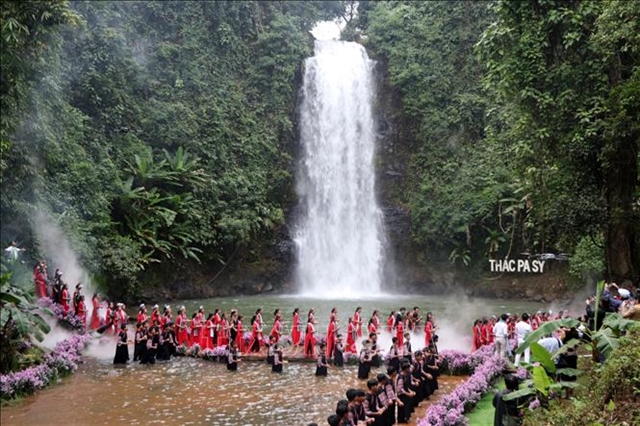 Society
Society

 |
| Pa Sỹ waterfall ecotourism area in Kon Tum Province's Măng Đen Town. The Central Highlands is focusing on establishing national-level tourism areas. — VNA/VNS Photo |
CENTRAL HIGHLANDS — The Central Highlands will focus on developing large production areas and national-level tourism sites, according to the regional plan for the 2021-30 period, with a vision to 2050.
By 2050, the Central Highlands region will be a sustainably developed area with a green, circular economy.
Some provinces in the region will be among the most developed provinces of the country.
Large production areas for industrial crops, fruit trees, vegetables, and flowers will be established; the region will become a renewable energy center of the country; high-quality tourist areas and attractive tourist destinations will be developed; and the forest ecosystem will be preserved and developed.
Economically, by 2030, the region's average GRDP per capita will reach VNĐ130 million (US$5,100); the economic structure will include agriculture, forestry, and fisheries accounting for 29 per cent, industry and construction 27 per cent, and services 38 per cent.
According to the regional plan, the northern Central Highlands sub-region, consisting of Gia Lai and Kon Tum provinces, will focus on the development of industrial crops, food crops, and international exchange hubs.
Tourism development will be promoted, with the formation of large-scale national-level tourist areas such as the Măng Đen eco-tourism area, Biển Hồ - Chư Đăng Ya tourism area, and tourism areas associated with national parks and nature reserves.
The quality of urban clusters Pleiku (which is the centre of the sub-region) and Kon Tum will be improved.
The central Central Highlands sub-region, including the entire Đắk Lắk Province, will be an international centre for agricultural science and technology research and application; a hub for regional exchange, trade, culture, and biodiversity conservation; and part of the Việt Nam-Laos-Cambodia development triangle.
Buôn Ma Thuột City will be developed as the centre of the sub-region.
The southern Central Highlands sub-region, including Lâm Đồng and Đắk Nông provinces, will be a centre for high-quality service and resort tourism for the country and internationally.
It will also be a region for high-tech agriculture, mining, multi-disciplinary training, scientific research, and bauxite ore extraction, processing, and storage.
Focus will be on developing high-quality eco-tourism, resorts, and medical tourism associated with a cooler climate, natural landscapes, and local culture.
Đà Lạt city will be developed as the centre of the sub-region. — VNS




